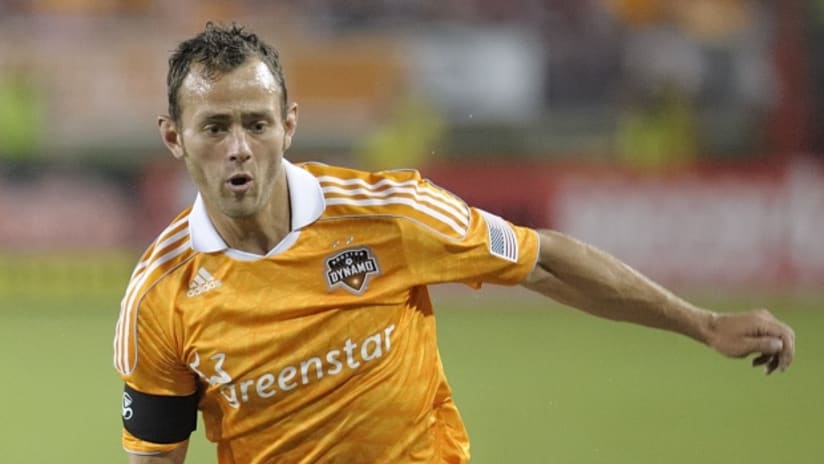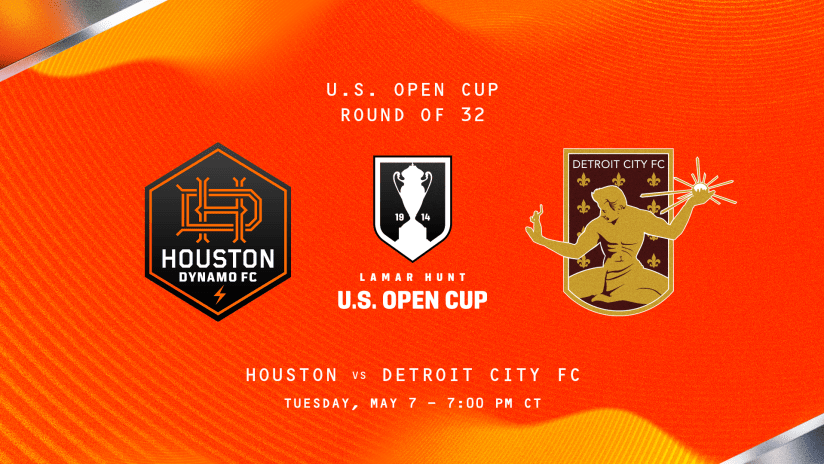As the MLS Cup playoffs continue, the MLSsoccer.com series "Playoffs In Profile" will take a look at the players and personalities who will each play a crucial role in their teams' hopes of winning the MLS Cup. In the eighth installment, managing editor Jonah Freedman examines the physical and psychological overhaul that led to a career year for Houston’s Brad Davis.
Check back with MLSsoccer.com to read the final story on Thursday as the "Playoffs In Profile" series continues.
If the Brad Davis of a decade ago could see the Brad Davis of 2011, he’d probably be pleased at how his career turned out just shy of age 30 – the mind-bending service, the leadership by example, the iron man who has yet to miss a game this season.
On the other hand, if today’s Brad Davis could have a word with his 19-year-old self, he’d probably punch him in the shoulder and wonder what on earth he was doing eating yet another burger and fries for dinner with a cold one to wash it down.
“When you’re young, you think you’re invincible,” the Houston Dynamo midfielder and MLS MVP candidate says, looking back on his younger, naïve self. “I was still playing the game because it was fun, but I felt like I was a kid just playing to play. I didn’t realize it was my job.”
The Brad Davis who has dazzled Dynamo fans in 2011 season is the complete package: one of the best soccer brains in the league, the veteran savvy of a champion, a leader in every capacity and, oh yeah, that mean left foot that helped the St. Louis-area native post a career and league high in assists with 16.
He is, by his teammates’ accounts, the consummate professional. If you want to succeed in the game, do what Brad does. Behave the way Brad behaves. Take care of your body the way Brad does.
During an up-and-down season in which the Dynamo have flittered in and out of the playoff picture, to the top of the Eastern Conference and back out again a handful of times, all while searching for consistency as players shifted around the pitch from position to position, the one constant has been Davis at left midfield.
He’s been the rock, the fulcrum that makes Houston tick, the winner who will stop at nothing. That he has become that person is a remarkable feat for someone who, as recently as three seasons ago, could barely make it 70 minutes into a game without doubling over to catch his breath.
Attitude Adjustment
At the end of the 2008 season, Houston head coach Dominic Kinnear sat Davis down and dispensed some tough love: He needed to take better care of himself.
Davis was, and still is, Kinnear deems, one of the purest natural talents he’s ever seen in MLS. He was a player who, when he was on the field, made a huge impact on the team’s fortunes. The problem was, he couldn’t stay on the field consistently.
The Dynamo’s quest to three-peat that year was near impossible considering their schedule. Between MLS play, the US Open Cup, the CONCACAF Champions’ Cup and SuperLiga, they played close to 50 games – often three games in the span of seven days. And Kinnear didn’t feel he could count on Davis.
“He’d get frustrated when I’d take him out and had a hard time understanding it was because I needed him ready for the next game,” Kinnear recalls. “His recovery time, he was at a fitness level where I think it was hard for him to compete.”
The message hit home for Davis. He knew that he needed to make an immediate change to his lifestyle or his career was going to end prematurely.
“It wasn’t necessarily a make-or-break time in my career, but I knew I had more to give,” he says.
Ironically, he realized he had been overlooking obvious inspiration for years. The guy wearing the captain’s armband, Wade Barrett, was 32 at the time and yet rarely missed a game. He was in better shape than anyone on the team.
Back when Davis joined the-then San Jose Earthquakes in 2005, Barrett’s ludicrously strict fitness regimen was something of a source of amusement to the young midfielder. Suddenly it occurred to Davis that Barrett had it right all along.
With the help of Dynamo assistant athletic trainer Shane Caron, Davis put himself on the P90X fitness plan, a rigorous routine that required more than an hour of intense exercise a day, alternating core exercise, weight-lifting and cardio – not including 90-minute yoga sessions. He stuck to it religiously, and overhauled his diet. He cut out fast food and anything fried. He eliminated desserts and sweets, his Achilles heel.
And he began to feel the difference immediately.
“At first it was really hard, both mentally and physically,” he says. “I was a country boy growing up and we didn’t have a lot of money – it was fried this and fried that. Bacon, whatever. But seeing Wade working out every day after training kept me inspired.”
By 2009, Davis had found a groove. He started to develop what he calls “more of a muscular tone” and dropped a lot of the pudge he had been carrying around for years. And on the field, the results were profound.
He started 26 games that year and logged 2,207 minutes – both career highs. He also logged career highs in assists with 12 and was named to his second All-Star team. Most tellingly, the injury problems that had been dogging him – the muscle pulls, the strains, the soreness, the slow recovery time – all started disappearing. He had become the durable player he never was in his youth.
And that was enough for him. He realized that he’d found a new lifestyle that was making him a better player.
Brad’s New Groove
As his body and performance improved, Davis upped his own ante. He began to feel more ownership over his team, more of a responsibility to be a go-to guy.
But as 2009 moved into 2010, the faces around him were new, too. Barrett retired to become part of the coaching staff. A carousel of stars from the Earthquakes/Dynamo dynasty – guys like Dwayne De Rosario, Stuart Holden, Ricardo Clark – had moved on.
And then the 2010 season, which started so high with expectations, began to fall apart. Barrett’s on-field leadership was sorely missed, and injuries decimated the team, including a serious knee injury to Geoff Cameron and a bad hamstring knock to Brian Ching.
The young Dynamo were rattled and were horribly mistake-prone, giving up points in the final minutes of games and failing to win back-to-back matches all season. By October, their final record was 9-15-6 and they missed out on the playoffs for the first time in Dynamo franchise history.
Davis took it personally. He felt like all the work he had put in to reinvent himself had been horribly derailed by his inability to lift his team. In reality, it was hardly his fault. It was just a rare off-year for a franchise used to success. But he wasn’t having that at the time.
“A lot of guys took it personally,” remembers Kinnear. “He was one of those guys.”
All Davis could do was keep working. During the offseason, he increased his workouts, encouraged all along the way by his exercise partner, goalkeeper Tally Hall. Though he no longer kept to the strict regimen of the P90X workout, he was still diligent about maintaining discipline in his routine.
“I learned a lot about that experience personally,” he says of that offseason, the furthest he’d been from an MLS Cup since joining the San Jose/Houston franchise in 2005. “You just can’t take these moments for granted. It takes a lot of hard work to stay a good team, and it’s that much harder to win Cup.”
In the meantime, Kinnear and president of business operations Chris Canetti were busy restocking the roster yet again to keep the Dynamo from suffering a similar letdown in 2011. Fourteen new players were added, by far the biggest clear-out in club history.
Davis remembers walking back into the locker room for the first time this past spring and his jaw hitting the floor.
“The turnover was amazing,” he recalls, “but it was also kind of rejuvenating. It’s like knowing you’ve got a blank canvas to see what you can do.”
And very early on, Davis realized that he was one of only four remaining players on the roster who remained from the last time the Men in Orange last hoisted MLS Cup in 2007. Houston’s opening-day roster was an average age of a shade over 26, the sixth-youngest in the league.
Davis was surrounded by kids, many of whom, he realized, were going to look up to him, the same way he looked up to Barrett.
“I knew I was going to have to step up and do something special,” he admits. “I was going to have to have a great year.”
Passing of the Torch
“Pressure” is the word Davis uses. It’s the responsibility he’s put on himself to become a leader, the general his troops follow into battle. It’s helped him maintain focus this season as Houston righted the ship over the course of an often bumpy year. And if you ask Davis, the fun is back again.
“I needed that pressure, to be totally honest,” he says. “I had to put myself in this type of role. It reminds me of what I have to do. You have to lead by example, you have to do what people expect.”
That includes everything, he says – from taking care of your body to handling yourself in a professional way off the field to making smart decisions. A week shy of his 30th birthday, it’s now Davis who is one of the fittest players on Houston’s roster. The parallels aren’t lost on Barrett.
“Not everybody who progresses through their career ends up taking that leadership role,” he says. “With all the turnover we had, guys needed to step into that role. Brad has welcomed the challenge. The key is that he continues to drive himself forward.”
Davis’ 2011 regular season was easily his best as a pro. Besides his 16 assists, he played in every league game (a personal first), led the league in chances created at 121, according to Opta (at 69, Philadelphia’s Sébastien Le Toux was the next-closest) and spent nearly 3,000 minutes on the pitch.
And he also donned the captain’s armband in 19 starts this season, perhaps signifying that his shift to become more like Dynamo stalwart Barrett has been a successful one for both Davis and the club.
He is the single most personifying piece of evidence of the Dynamo’s turnaround in a year when many wrote them off before a single ball was kicked.
The cries for MVP have gotten louder as the season approached its close. And Davis isn’t playing politics about it: He wants to win it.
“I’d be lying if I said I didn’t,” he says. “But it’s not up to me. Hopefully [the voters] will see what’s been accomplished, not just by myself, but by the whole team. If I don’t win it, I’ll still be proud of the season I’ve had.”
Odds are, the Brad Davis of 10 years ago would be beaming with pride at his future self. He might even call him a role model, and offer to buy him a beer. And that’s OK – even the new Brad Davis indulges every once in awhile.





